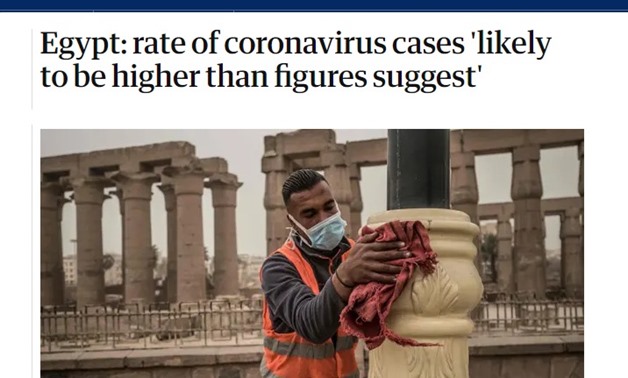
Screenshot of Guardian article
CAIRO – 18 March 2020: In a Tuesday statement, SIS demanded an apology from the Guardian for publishing the report that cited a Canadian medical doctor's study claiming that infected people in the country may amount to more than 19,000. The official number stands at 196, with six deaths and 26 recovered cases at the time of writing.
The statement said that the Guardian reporter's license in Egypt was canceled and that they gave a warning to chief of the New York Times Cairo bureau Declan Walsh.
CAIRO - 17March 2020: The State Information Service (SIS) has canceled the license of the Guardian reporter and gave a warning to the chief of the New York Times bureau in Cairo over false figures on the coronavirus in Egypt.
And here is the full statement:
Firstly: The General Information Authority, through its role in following up what is published about Egypt in the foreign media, has monitored the release of a press report in the British newspaper The Guardian on Sunday, March 15, which includes incorrect numbers and estimates regarding the cases of Coronavirus in Egypt.
It also monitored a group of tweets published by the reporter of the American newspaper New York Times in Egypt, including the same incorrect and exaggerated numbers that raised a lot of contraversy in Egypt and the whole world following with great concern everything related to this danger that is threatening humanity.
Secondly: With regard to the report and the tweets' content that violates all the recognized journalistic work ethics in Egypt and the world, journalist Diaa Rashwan, head of the State Information Service, summoned on March 16 both the Guardian's and the New York Times's correspondents. The reporters were confronted with their published content that aimed at misleading the readers. They were further confronted with the following:
The correspondents relied on one single source to this important data and information, while the rules of journalism require relying on more than one source to confirm the information before publication. This source is an anonymous Canadian doctor, who said he conducted a study based on arbitrary estimates of international air traffic and passenger numbers, which lead to false conclusions. Also, a WHO statement was issued indicating that this study is based on "speculations", and the organization does not accept accreditation based on speculations.
None of the reporters was interested in citing the opinion of the parties involved in the issue, in accordance with the rules of the press in the whole world, and at the forefront of these parties are the concerned authorities in Egypt, especially the Ministry of Health, and the World Health Organization's Cairo office or main headquaters in Europe.
The fact that the reporters hastily promoted incorrect data relying on an unpublished, unjustified and unrecognized study reveals the bad intention of the reporters to harm the Egyptian interests and undermine the country's stability.
The Egyptian Ministry of Health and the World Health Organization denied in official statements these arbitrary estimates. Moreover, the World Health Organization praised the efforts of the Egyptian state, its cooperation and transparent conduct in its fight against this epidemic. In addition, facts in Egypt are available to hundreds of foreign correspondents, who roam freely all over the country, and can monitor situations and phenomena on the ground.
The head of the State Information Service demanded that the correspondent who can provide information about fatalities that have not been disclosed by the Egyptian state can do that.
Thirdly: In light of the intentional professional abuses committed by the Guardian and the New York Times' correspondants, and given that none of the reporters apologized for their committed violations that had grave repercussions, the State Information Service has decided the following, in accordance with the Egyptian laws and regulations, the international law and the work rules of foreign correspondents in various countries of the world:
Withdrawing the license of the correspondent of the Guardian in Egypt.
The State Information Service requires the British newspaper to publish an apology for this report full of professional errors, according to press norms, or all the legal measures will be taken, including closing and withdrawing the license of the newspaper's office in Egypt.
A warning will be issued to the correspondent of the American newspaper in Egypt that stipulates the necessity of respecting the rules of the journalistic profession in Egypt, which are the rules approved by the newspaper in which he works.
The State Information Service praises the professional performance of many international press institutions that have offices and correspondents in Egypt. The information authority appeals to journalists to adhere to the global principles of the profession and to deal with the current critical situation with transparency and without manipulation. The agency stresses that it will not tolerate such practices from any party.
Comments
Leave a Comment